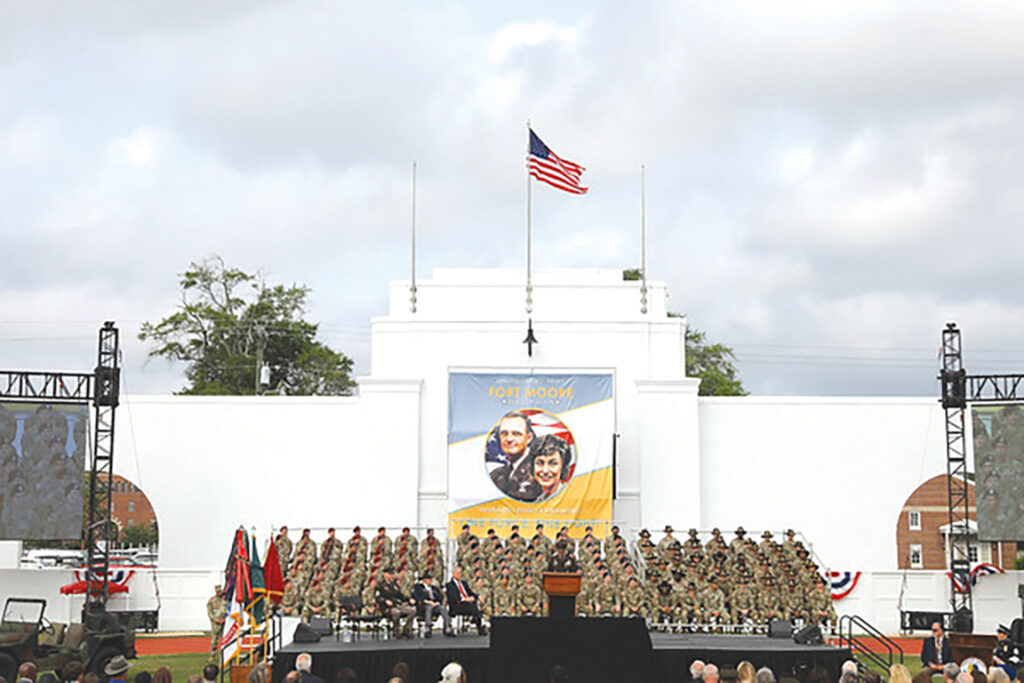OPINION —
As a soldier myself, a remark I heard often on Army deployments was, “Back at Bragg ….” The soldier who said it was invariably wearing the Airborne or Special Operations Forces patches from the base in Fayetteville, North Carolina. The comment was followed by something like, “Back at Bragg, for physical training, we run or swim through alligator-infested swamps, scale 20-feet walls and do 300 one-arm push-ups.”
The implication was that Fort Bragg produced the toughest, meanest soldiers in the Army. Possibly, but other posts such as the Home of the Infantry in Columbus, Georgia, had credible claims to it, too. Fort Bragg is now Fort Liberty, and Fort Benning is Fort Moore. Nobody I know believes changing fort names will hurt training, readiness or toughness.
“We gather today to pay tribute to two American heroes: Lt. Gen. Harold Moore and his wife, Julia Moore,” said Maj. Gen. Curtis Buzzard, Maneuver Center of Excellence and Fort Moore commanding general.
He spoke at the rededication ceremony at Doughboy Stadium on May 11.
“Since its establishment over a century ago, this Army post has symbolized strength, courage and sacrifice,” he said. “Today, we affirm our commitment to those values and the men and women who have dedicated their lives to protecting our nation.”
On a blogpost addressed “Remembrances of Things Past,” psychology Professor Jerry Burger, Ph.D., said most people were pleased with a visit to one’s childhood home or former workplace (that similarly applies to military installations where people spent a long time).
“Some people did not get the hoped-for results,” Burger wrote. “For example, they discovered that unlike the romanticized memories, in reality, there was nothing romantic about the place (the old home or military installation from previous years). If happy there, they could not recapture that happiness and for those who experienced abuse and trauma, the visit brought back pain rather than closure.”
A family friend of mine spent her childhood in a bucolic, upscale area of New Jersey. After 40 years, she was finally on a trip that would take her near her childhood home. She went back and later told us she was delighted the place was not destroyed by development. She hoped to come back again, to again capture the nostalgic feelings she found.
In 2010, I visited what used to be Fort Benjamin Harrison, Indiana, where I had attended four journalism courses, three to eight weeks each, in the 1980s. Decommissioned in 1991, the fort now has a large, beautiful state park. And small businesses are moving into charming early-1900s houses. Yet inside the building where I learned journalism was no remnant of its past use. It is now a quiet community college; the excitement we soldiers had does not seem to have been sustained.
At the Rededication Ceremony at Doughboy Stadium, there were no protests by people opposing the renaming from Benning to Moore. This was surprising, as a high number of people associated with Fort Benning, or even just local citizens, consistently said they were not comfortable with the name change. These people were against “change for change’s sake.”
Others were outraged with the potential cost of multi-millions of dollars to rename the fort. With the eight other targeted forts, a cost of at least $21 million will be incurred. Many observers predict the total costs for the nine forts will exceed $21 million. Others felt that as Fort Benning was a sentimental and nostalgic part of their lives, it should not jettison a much-loved fort label.
“Fort Moore stands alone since this rededication is not solely about a name or one person’s achievements,” said retired Col. David Moore, on behalf of himself and his four siblings. “Instead, it is about personal character, represented by Army values, reinforcing the fundamental truth that soldiers fight as a team.”
Also speaking was retired Col. Tony Nadal, a rifle company captain under Moore’s command in the Battle of LZ X-Ray, in Vietnam.
“Renaming this post in Hal and Julie’s honor serves as a beacon to inspire many young men and women who follow them with honor, integrity and allegiance in service to their country,” Nadal said. “Lt. Gen. Moore’s character, competence and professionalism were evident in everything he did and every part of his life.”
A dividend when I moved south in 1996 was the closeness to Fort Benning. I often go on long walks there and shop at the PX. Also, I taught soldiers and family members at two colleges on the fort. Soldiers still say, “back at Bragg,” but with time it will become “back at Fort Liberty.” Also, “Ranger School at Benning was tough” will become “Moore is a great, challenging duty station.” I am confident the new names will catch on. My sense today is that it may take a year or two, though.
Greg Markley first moved to Lee County in 1996. He has master’s degrees in education and history. He taught politics as an adjunct in Georgia and Alabama. An award-winning writer in the Army and civilian life, he has contributed to The Observer for 12 years. gm.markley@charter.net
